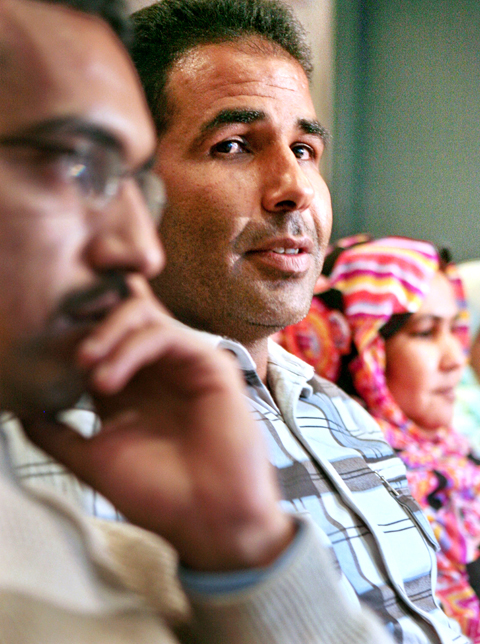One man describes a harrowing dash through a mine field, his pregnant wife in tow, as they raced to escape from the very rebels who were supposed to be protecting them.
Another talks of unmarried pregnant women and unwed mothers, including rape victims, being held in a special prison for adulterers — ostensibly to protect them from relatives bent on redeeming the family’s honor.
The stories, recounted by five Western Saharan refugees on a Moroccan-sponsored trip the US, cast a new spotlight on a largely ignored three-decade-old conflict between the rebel Polisario Front and Morocco over a mineral-rich region to which both lay claim.

PHOTO: AP
But in a war for independence that has gone largely unnoticed outside of the region, the testimonies also represent the latest salvo in a battle where propaganda increasingly plays a greater role than bullets.
“There is no future under the Polisario. There is no freedom of movement. There is no freedom of speech,” Said Abderahman said in an interview. He is one of the refugees whose trip to the US was sponsored by the lobbying group, Moroccan American Center for Policy.
“If you dare to talk they take you and put you in jail, and they bring you to a public place and they accuse you of being a thief, in front of society,” he said, speaking through a translator provided by Morocco’s UN mission in New York.
Morocco and Mauritania split Western Sahara when Spanish colonizers left the territory in 1975, but a year later they went to war over it. In 1979, Mauritania pulled out and Morocco took over the whole Western Sahara. But fighting continued between the estimated 15,000 Polisario guerrillas and Morocco’s US-equipped army, leaving thousands dead.
A UN-negotiated truce in 1991 called for a referendum on the region’s future, but that vote never happened because the two sides could not agree on voting lists. The stalemate has been monitored by UN peacekeepers.
Over the years, Morocco has pressed the UN and the world community to allow it to annex the territory, promising considerable it autonomy and a share in its mineral wealth. The autonomy offer is backed by the US and France. More than 50 countries, however, recognize the government-in-exile of the Sahrawi Arab Democratic Republic.
In March, the two sides ended a fourth round of talks under UN auspices, blaming each other for their standoff, but agreeing to consider easing restrictions against people traveling by road to visit family in the disputed territory.
Tens of thousands of residents who fled the fighting remain displaced, living in camps in Algeria.

POLITICAL PRISONERS VS DEPORTEES: Venezuela’s prosecutor’s office slammed the call by El Salvador’s leader, accusing him of crimes against humanity Salvadoran President Nayib Bukele on Sunday proposed carrying out a prisoner swap with Venezuela, suggesting he would exchange Venezuelan deportees from the US his government has kept imprisoned for what he called “political prisoners” in Venezuela. In a post on X, directed at Venezuelan President Nicolas Maduro, Bukele listed off a number of family members of high-level opposition figures in Venezuela, journalists and activists detained during the South American government’s electoral crackdown last year. “The only reason they are imprisoned is for having opposed you and your electoral fraud,” he wrote to Maduro. “However, I want to propose a humanitarian agreement that

ECONOMIC WORRIES: The ruling PAP faces voters amid concerns that the city-state faces the possibility of a recession and job losses amid Washington’s tariffs Singapore yesterday finalized contestants for its general election on Saturday next week, with the ruling People’s Action Party (PAP) fielding 32 new candidates in the biggest refresh of the party that has ruled the city-state since independence in 1965. The move follows a pledge by Singaporean Prime Minister Lawrence Wong (黃循財), who took office last year and assumed the PAP leadership, to “bring in new blood, new ideas and new energy” to steer the country of 6 million people. His latest shake-up beats that of predecessors Lee Hsien Loong (李顯龍) and Goh Chok Tong (吳作棟), who replaced 24 and 11 politicians respectively

Young women standing idly around a park in Tokyo’s west suggest that a giant statue of Godzilla is not the only attraction for a record number of foreign tourists. Their faces lit by the cold glow of their phones, the women lining Okubo Park are evidence that sex tourism has developed as a dark flipside to the bustling Kabukicho nightlife district. Increasing numbers of foreign men are flocking to the area after seeing videos on social media. One of the women said that the area near Kabukicho, where Godzilla rumbles and belches smoke atop a cinema, has become a “real

‘POINT OF NO RETURN’: The Caribbean nation needs increased international funding and support for a multinational force to help police tackle expanding gang violence The top UN official in Haiti on Monday sounded an alarm to the UN Security Council that escalating gang violence is liable to lead the Caribbean nation to “a point of no return.” Special Representative of the UN Secretary-General for Haiti Maria Isabel Salvador said that “Haiti could face total chaos” without increased funding and support for the operation of the Kenya-led multinational force helping Haiti’s police to tackle the gangs’ expanding violence into areas beyond the capital, Port-Au-Prince. Most recently, gangs seized the city of Mirebalais in central Haiti, and during the attack more than 500 prisoners were freed, she said.